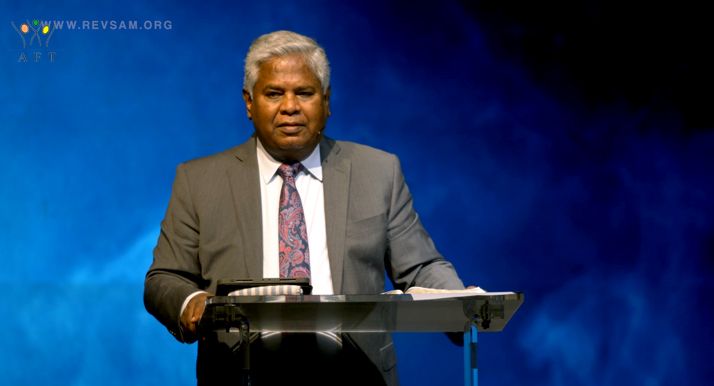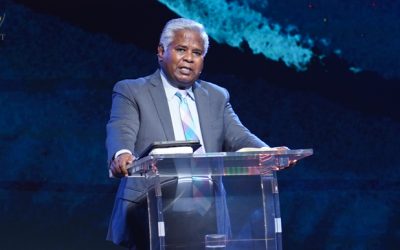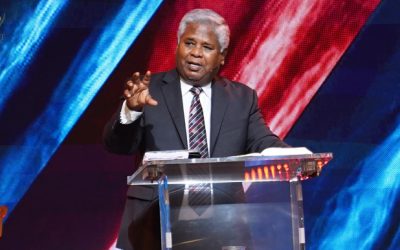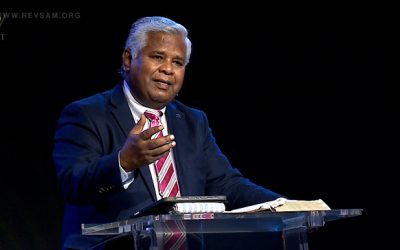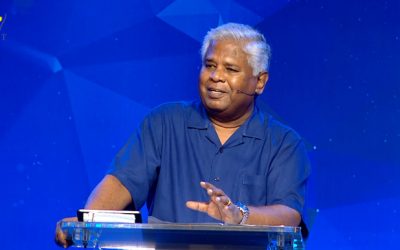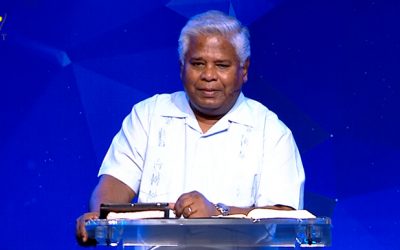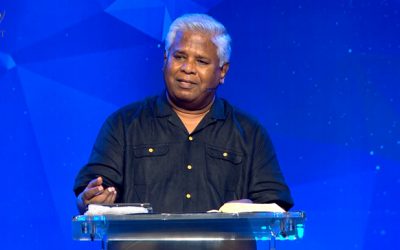
How Grace Changes Us? (Part 9): Pride
Sunday English Service – 23 JAN 22
Transcript
I trust and hope that you’re all keeping safe and doing well, by the grace of God. We’re still continuing our services online only thank God for the facilities that we have available to do these things online, even during these difficult times. Let’s go to the Word of God. As you know, we’ve been teaching on the subject of grace for quite a long time. And we’re in the last few weeks of this teaching. And the last few weeks we’ve dealt with how Grace changes us. We went to 1 Corinthians 13. And in 1 Corinthians 13, verse three, I believe is the key. Paul makes a tremendous statement there. He says, if I give all I possess to the poor, and surrender my body to the flames, but have not love, I gain nothing. Makes a statement. It’s very unusual. He says, every Christian needs to understand that, that a person is capable of extraordinary good works, such as giving all that he possesses to feed the poor, or even giving his body to be burned. He can do such good works without the heart being ever touched by the Holy Spirit and changed by God at all. Without any change of heart, a person is capable of such extraordinary good works. Now that is something that we all need to understand. So when you see good works immediately don’t decide, it has come from a changed heart. It can come from a heart of fear, heart of pride, a heart that has a desire for power, name and fame and so on. People do for so many things. There may be so many different motivations that work behind the good work. So people are capable of good work without ever having a change of heart. But then, after making that statement, that important statement, he goes into verse four. And until verse seven, he gives a list of traits and characteristics of a person who’s changed in the heart who’s had a change by the power of God in their hearts.
Now he puts it like this, he lists the traits and characteristics of a heart that has changed. From verse four, he says love is patient. Love is kind. Love does not envy, it does not boast, it is not proud, it is not rude, it is not self-seeking, it is not easily angered, it keeps no record of wrong things. Love does not delight in evil, but rejoices with the truth. It always protects, always trusts always hopes, and always preserves. Now in these traits, we began to look at a few of the traits in order to see how Grace changes us. Because when sin comes in it ruins us completely, the heart is ruined, becomes an evil heart and out of the evil heart comes all kinds of evil things. But when the grace of God comes and touches our lives and changes us. Again, the change happens in the heart, whatever sinners ruin the grace sets right. But it also makes everything much more beautiful and wonderful than it was ever was. That’s the work of God’s grace. Where sin abounds, grace does much more abound. Grace is much more powerful than sin. Therefore it does a lot more than what sin does. In a very positive way, it changes us. So he’s making a list of these things. So we looked at several traits. We looked at the first trait which is love suffers long. That’s what the old translation says. Love suffers long. We looked at long suffering, the issue there I showed you is forgiveness. And we looked at it. Then we looked at how love is kind. That’s another trait of changed heart, kindness, we looked at it. Thirdly, we looked at a trait that is listed in another place. Galatians chapter five, in the fruit of the Spirit. There is another list of traits of change heart. Peace is one of them and we looked at peace.
And then we looked fourthly at what verse seven says, Love bears all things. The issue there I showed you last week is acceptance, how we receive and accept people. So we look all these things. Today we want to look at another thing in this list in 1 Corinthians 13. That is in verse 4, the later part of verse four we read, love does not boast. It is not proud. This is a very important trait of a change the heart. One of the most important signs of a sinful heart is the boasting and the pride that is in the sinful heart, comes right from the devil. The Devil’s nature is that pride, the boastfulness and when the grace of God begins to changes and make everything beautiful and wonderful, it deals with that boastfulness and that pride. And that is what we read about here. It goes together, it does not boast, it is not proud. Such a person who’s been changed in his heart, it does not boast and is not proud. Now, I want to read another passage from one Corinthians, 1 Corinthians chapter 3, verse 21, all the way to chapter four verse one to seven. Because that passage, deals with a particular problem in the church in the Corinthian church, and deals with this problem of boasting and pride. Let me read it to you. 1 Corinthians three, verse 21. So the no more boasting about men. All things are yours, where Paul or Apollos or Cephas, or the world, or life, or death, or the present, or the future, all are yours, and you are of Christ, and Christ is of God. So he is addressing the problem of boasting. They’re boasting about men. And he’s dealing with that, and continues it in chapter four, verse one, so then men not to regard us as servants of Christ, and as those entrusted with the secret things of God.
Now it is required that those who have been given trust must prove faithful, I care very little, if I’m judged by you, or by any human court. Indeed, I do not even judge myself. My conscience is clear, but that does not make me innocent. It is the Lord who judges me. Therefore, judge nothing before the appointed time they till the Lord comes, He will bring to light what is hidden in darkness, and will expose the motives of men’s heart. At that time, each will receive His praise from God. Now, brothers have applied these things to myself and Apollos for your benefit. So that you may learn from us the meaning of the saying, do not go beyond what is written, then you will not take pride in one man over against another or who makes you different from anyone else. What do you have that you’re not receive? And if you did receive it, why do you boast as though you did not? Paul is dealing with a problem in the Corinthian church, the problem of division and strife, the cause for the division and strife is the boastfulness and the pride that is found in some people there. The church was planted by the apostle Paul, as you know, and then later on, people like Apollos and others, come and minister there. So people get attached to all these people, these remarkable men of God that come and do some ministry there. Some are trained, mentored, and appointed by Paul in leadership. Some others were trained, appointed, mentored by men like Apollos. And so the church goes on, but instead of being happy that they were trained by men like Apollos and men like Paul, these people started using their relationship with these men, as the basis of power plays, so that some in the church started saying, well, I got trained by Paul, therefore, I must be given a place of importance here, because I’m Paul’s disciple.
Some others are saying, well, I’m a Apollos disciple, therefore I must be given an important place and so on. So they’re fighting based on who they belong to, or who there are disciples of. Based on these men, they’re fighting they’re boasting about these men. One says Apollos is greater than Paul, the other says Paul is greater than Apollos and so on. They’re boasting and they’re proud. Now, in this passage, Paul shows the root cause of why they couldn’t get along. Boasting and pride is the cost. Not only that, if we take it in a larger sense, the root cause of why there is no peace in the world is not the very same thing as boasting and pride. Some people think they’re better than others. That is the problem with a society. That’s why we fight that’s why there are so many differences, divisions. That’s why there’s so much hate. That is why there is so much problem in society today. Because some people think they’re better than others. And when you think you’re better than others, other people are not going to keep quiet, and take it silently, they’re going to resent and retaliate. And that’s what is bringing up all the hate and the wickedness and the violence and all of those things in society and in the world at large. So there is no peace in the world because of the boastfulness and the pride that rules in man’s heart. He is sin has caused the hearts to be evil, boastful and proud. And that’s a reason why people couldn’t get along together. So it’s pride and boasting, that’s a problem in the church pride and boasting, that’s a problem in the world at large. And Paul is dealing with that.
Now, up until the 20th century, people generally thought that it is the high self-esteem that was in some people that was causing the problem. That people — some people thought of themselves more highly than they ought to think. They thought they’re so special, they’re higher than the others, they’re better than the others. And that is the thing that caused the problem in society. That is the way that people traditionally thought and up until 20th century, that was the thinking. But then in the more modern times, in the western society, especially people started thinking exactly the opposite way. They said, no, it’s not the high self-esteem. It’s the low self-esteem, that’s the reason for all the crime, the violence and all the misbehavior. Everything is due to the low self-esteem. So they began to deal with their education system. They’re dealing with the prisoners in their prisons, and dealing with their legislation, everything. Even their counseling is based on this fact of low self-esteem. People are suffering from low self-esteem. That’s why they behave in this unacceptable ways. They said, the reason behind all misbehavior is low self-esteem. That’s the reason for domestic violence. That’s the reason for criminals doing what they’re doing. So the world came under this kind of idea, some time ago. And it’s very deep rooted nowadays. But recently, again, the pendulum swung back to the high self-esteem problem. So that now they’re saying that studies are showing that people with high self-esteem pose greater threat to those around them than people with low self-esteem.
So feeling bad about yourself, is not the cause of our biggest problems. They say now, and people find it very difficult to accept that high self-esteem is the problem. Because they are used to this thinking, they’re oriented to thinking that the low self-esteem may be the problem, and if it’s low self-esteem is the problem, then they don’t have to think about making moral judgments about such people, all they need to do is support such people, and build those people up and help those people up and they’ll become better. So that seemed like a good thing and decent thing to do. But if you think that high self-esteem is the problem, then you’ll have to make some moral judgments. And then you have to clamp down on people, you have to convict people call them bad, and so on. And they don’t want to deal with that in that way. People generally in present day world, they don’t like this idea of sin and evil and all of that. They don’t like that idea, I know. They just like to say that all the people are sick rather than that they’re sinners. They like saying that everybody’s sick. So since everybody’s sick, all we need is doctors and psychologists because you got to just deal with their sickness. And as long as you deal with that sickness, you’re fixing their problems. But if you say that everybody has the same problem, and the same problem is basically deep-rooted pride and boastfulness, that’s how it manifests itself, then you need a savior, someone to deliver you from that problem, and they don’t want to deal with that. So Paul’s the Apostle Paul brings about a very enlightened teaching about this here in this passage. There are three things that he shows here about the approach to the self. He suggests a way of seeing yourself that is absolutely and utterly different from anything we have known.
People only talked about the high self-esteem problem and the low self-esteem problem and so on. But what Paul is talking about is totally different. He says three things, in this passage about how to look at yourself, how to deal with this. One, he talks about the natural condition of the human ego. Ego is a person’s sense of self-esteem and self-importance, self-worthiness. What does he think about himself? That’s what the ego is. The natural condition of a human ego. What is the average natural heart like? What does a person think about himself? What is the basis of his thinking, that he shows. Secondly, he shows the supernatural condition that can be brought about through the gospel, and the change that can come through the gospel. That is the transformed self, and identity that he has discovered? That’s what we’re going to learn today. The transformed self and identity. And thirdly, how to get it. Let’s look at these three things quickly. The natural condition of the human ego, what is the natural condition of the human ego? How do people look at themselves? How do they determine their self-worthiness? How do they steam themselves? How do they look at themselves? Now, the Bible uses the word pride here, in verse six, it says, let’s have no more pride. Paul says, Let’s have no more pride. In verse six, the word pride that Paul is using here is a very unusual word. What is significant about this word is it’s not the normal word for pride. In fact, if you read the New King James Version, I was reading for you from NIV. But if you just read the New King James Version, where in verse six, he says, let’s have no more pride. Look at how MKJV translates it here. He says, none of you may be puffed up on behalf of one against the other. None of you may be puffed up on behalf of one against the other. NIV translates it as then you will not take pride in one man over against another. There it translates it as pride. Here it is translated as getting puffed up, puffed up is the proper word that Paul uses. It is a different word from the normal word pride that is used usually. It is a word that Paul uses six times in this book in 1 Corinthians. It is used by no one else in the entire Bible. Paul uses it one time in Colossians. But six times here in this book looks like every other chapter has this word coming up again and again. Seems like a big theme, a special theme of Paul that he’s dealing with is pride. And he describes it as being puffed up. Because the word for pride literally means to be overinflated, swollen, bloated beyond its proper size. That’s why MKJV chose to translate it as being puffed up.
Now we talk about a person having a big head. That’s the same thing, puffed up. Now it’s a word that’s related to the word for bellows. In an accordion there is a bellows, you just — it generates air. And that’s how the sound of the instrument comes out. And it’s very evocative and powerful word that describes the problem. It evokes the image of some organ of the human body that is so bloated, because so much air has been pumped into it, that it’s ready to burst. That’s the picture it gives. Puffed up means that it has been infused with air to the point that it’s ready to burst. It’s overinflated. It’s bloated, it’s swollen. And it’s inflamed, because it has been extended beyond its proper size. Now that’s the condition of the human ego he says. That’s what Paul is saying here. Now, it is because this particular metaphor is used puffed up, wants us to think about pride as something like that being puffed up. We’re supposed to reflect on what does this puffed-up mean? What does this metaphor mean? What this word this particular word means? What is he trying to say, by using this particular word?
I’ll put it this way. This means that the natural condition of the human ego, if it’s puffed up, then it’s got four main problems. And that is, one, if it’s just puffed up with a lot of air, it’s empty, it’s not puffed up with something solid, it’s not filled with something solid. It’s is just puffed up. Just a false thing is just filled with something. It’s not filled up with something solid. It is just puffed-up. So it’s empty. And secondly, because it’s empty, it is painful. And I’ll show you how. And then, since it’s empty and painful, it’s busy. It’s busy trying to find something to fill it. And it’s fragile. It is breakable, it is easily breakable. Look at the fact that it is empty, the human ego. And it’s filled with pride when it’s puffed up. So unnatural. No matter how big you can puff it up. No matter what you can think of yourself and puffed-up. It’s like all air, nothing else. It’s emptiness. And it is natural state of the human heart, to try to build once identity around something other than God. Man is like that, because he has fallen in sin. He doesn’t want God because when God comes in, everything has to change. He’s got to yield, he’s got to obey, he’s got to live by what God says and so on. So men does not like to invite God into his life, he wants to live without God. So he wants to build an identity around something other than God. So pride, spiritual pride, is an illusion, that a human being is competent to run his own life, he is able to achieve his own sense of self worthiness, and he is able to find a purpose that is big enough, and give meaning to his life without including God, without God, apart from God.
Now, the natural human ego, therefore is built on something other than God. It’s built on something besides God, and that’s something he hopes will give him worth. That will give him a special sense of worthiness, specialness. And it’ll give him a special sense of purpose, he believes. The thing is, if you put anything in the place that was originally made for God, it’s going to be too small. It’s going to be rattling in there, because it’s too small. There is going to be emptiness in that place. Secondly, it’s painful. What do we mean when we say it’s painful? Just imagine the human body. Now when I came here to church today, I was not conscious of my body. I was not coming here saying, oh, my wonderful toe is working so well today or what my wonderful elbow is doing so well today, and it feels so wonderful. No, I was not thinking about my elbow, I was not thinking about my toe. Normally, I don’t think about that I just come and just walk in and do the things that I ought to do. I’m not even conscious about my body. But if there is something wrong with my body, if my toe was broke or fractured or if my I had any problem with my toe, then I will be conscious about that. Now human egos like that. Have you ever noticed that people are very conscious about their ego? Their ego is always hurt. Have you ever seen that? People will always say, well, my feelings are hurt. My feelings are hurt, they will say. Now, how can you hurt your feelings? What they mean is their ego is hurt. Their sense of self worthiness is hurt. Something has happened. That kind of knock down their sense of importance and self-worthiness.
So that is what they’re saying, my feelings are hurt, they say. Now, it’s like this, just walking around doesn’t hurt my toes. But if there is something wrong with my toes already, then it’ll hurt, just walking around will hurt. Now, that’s the problem with human ego. There is something wrong with people’s identity, there is something wrong with people’s ego. There is something wrong with a sense of self and with a sense of who they are. Something wrong with the way they look at themselves. So that it’s always drawing attention to itself, there’s so touchy, they always feel wounded, they always feel like oh, somebody hurt me in my feelings are hurt, and this and that. And because they’re so — there’s something wrong with it. Just like I said, let me say it again, just walking around, doesn’t cause any pain in my toes. But if there is already something wrong with my toes, it will cause pain. Similarly, just living a life in this world, normally will not cause you to have all these kinds of issues. People have these all these kinds of issues with their ego, their feelings are hurt, and they’re so touchy, and they’re murmuring and complaining and feeling bad and downtrodden and all that. Because the problem is, that is something already wrong, they have puffed up ego, they have filled their ego with something other than God, they have put something in the place of God, and therefore it is painful. Therefore, that emptiness leads to painful experiences every day.
Thirdly, such people get very busy. That’s the third thing. They get very busy. What do I mean, they always draw attention to themselves? That ego always draws attention to itself. It’s trying to fill itself. It’s busy by doing two things. One, how does it feel itself? How does it — how does it try to puff itself up? How does it try to fill the emptiness? It does two things, constantly compares with other people, and boasts, comparing and boasting, comparing and boasting you’ll see that a lot comparing and boasting. See, pride by nature is competitive. That’s what they were doing. That’s what Paul is saying, then you will not take pride in one man over against the other. You will not be fighting saying I’m of Paul and I’m of Apollos. You will not be fighting about whose greater, Paul or Apollos. You will not be fighting saying I’m from Paul therefore I’m greater than the one from Apollos. No. What you’re doing is you’re being competitive and you’re comparing and boasting, that’s what you’re doing, he says. So the normal egos not really empty, tries to fill its emptiness. Deal with that discomfort by comparing with other people all the time, all the time. So pride is very competitive. Pride has no pleasure of having something. He doesn’t enjoy just having something. It only enjoys something because he has more of that than the other person. Always comparing. I have more of it than the other person. So when they happen to meet people that are more successful, more intelligent, more good looking or something like that. Their air is out there, they’re puffed-up thing gets busted. They’re not happy. They lose all pleasure in what they have when they meet other people that are better than them in some areas, because the other person has more. So they cannot enjoy what they have.
So pride is the pleasure of having more than the next person. That’s what pride is all about. So it’s always comparing, is always boasting. Try to make up for the emptiness. Fourthly, it’s fragile. What do I mean by fragile. Means if it’s inflated, if it’s bloated, if it’s filled with all just air and nothing’s solid, it’s going to burst. It’s going to, if you just puff it up, there stands a chance of it getting punctured. That’s what it is. You’re constantly in danger of being deflated. If you were inflated, then constantly you’re in danger being deflated. If you’re puffed up and not filled up really with something solid, then whether you’re inflated or deflated, doesn’t matter. It’s the same thing. That’s why superiority complex and inferiority complex are no different. It’s the same thing. One is getting puffed up and the other is getting deflated. One is getting inflated. The other is getting deflated. They’re both results of being overinflated, bloated, empty, painful, busy, and so on. All right. So here’s what happens in such people. They are never satisfied. When they’re puffed up, when this pride comes into people, when they get puffed up, that desire for self-worth is never satisfied. They always want to prove themselves. They’re always waiting for others to give them a verdict that they are something special. They are excellent and they are great. And they are somebody and so on. That’s the problem. They’re never satisfied. They do something great. And they feel like they’re so special. And they’re somebody, they feel a sense of great importance and achievement, but that will not satisfy them. Next day, they’ll get up and they’ll have to do something else because it’s like every day, their face with this problem, it’s never satisfying to them. And Paul shows us the right way. Look at what he says. Let’s read from I Corinthians chapter four verse one says, men ought to regard us as servants of Christ. And as those interested with the secret things of God. So we have been given the things of God to minister it to people, he says. Now it is required that those who have been given a trust who must prove faithful. Those that have this trust given to them, those whom God has chosen and given them this anointing, this message and so on to go and give it to others and do his work. They’re responsible. They need to prove faithful.
And then he says, I care very little if I’m judged by you or by any human quote. Indeed, I do not even judge myself. After saying that yeah, we’ve been interested with this great thing, responsibility, and we must prove faithful, but I don’t care what you think about me, how you judge me, he says, and I don’t care about what any human court. No, they’re not all standing in the court, they’re Corinthians. He is not talking about an actual court. He is metaphorically using it and I’ll show you why he is using it. So he says — in other words, he’s saying I’m not like all the time standing before you like standing in a court, waiting for a verdict. I’m not waiting for your approval. I’m not waiting for anybody’s approval. I’m not waiting for anybody’s judgment about how I’ve done my work. I’m not waiting for anybody to say that I’ve done a fine job or I’ve not done a good, no, it doesn’t matter to me. I don’t care what you think. I don’t care what any human court thinks. He says, and I don’t even judge myself, he says. I don’t even judge myself. Now why is he saying that? He’s saying that his ego, his identity, his sense of who he is and his importance and his self-worth is not tied in any way to what others think about him, to what anybody thinks about him.
It is not tied in any way to anything out there, he says. Now, when you go to counselors and when people have problem and they go to counselors, they’ll always counsel them in this way. People have these problems, ego problems. They always say something like this. It shouldn’t matter what other people think of you. It shouldn’t matter what their standards are. It should only matter what your standards are. Choose your own standards, decide what you want to be. And then be it. It just matters what you think about yourself. Now is that what Paul is doing here. Is that what Paul is saying here? In our modern world, we don’t know how to deal with low self-esteem without basically remedy it with high self-esteem. Saying, you need to see yourself as a great person. You need to see how wonderful you are. You need to see all the great things that you have accomplished. You need to count them one by one, and you need to see the wonderful things that you have done. And you ought not to worry about what people think about you. You set your own standards and accomplish them. And then you evaluate yourself. That’s the way the world deals with it. Paul says, I don’t care about what you think about me. I don’t care about what anybody thinks about me. And then listen to this. He is coming up with something brand new. The world says don’t care about what others think. It only matters what you think. Paul says, I don’t even judge myself. What I think about myself also doesn’t matter, he says. I don’t care what you think. I don’t care what anybody thinks. And I don’t care what I think, he says. He says, I have a very low opinion of your opinion of me. And I also have a very low opinion of my opinion of me. I have a very low opinion of your opinion of me. I have a very low opinion of anybody’s opinion of me. I have a very low opinion of my opinion of me, he says. Very different. He’s taking a new path. Look at what he says in verse four. My conscience is clear, but that does not make me innocent. It’s the Lord who judges me, whether I’ve done a good job or not, my conscience is clear, but your conscience is clear doesn’t mean that you’re innocent.
Hitler in his day might have said, my conscience is clear, but he was not innocent. What he committed was a great crime. He might have felt all right about it. Paul says, my conscience is clear, but that does not make me innocent. It’s the Lord who judges me. It’s the Lord who judges me, he says. In other words, he’s taking a new path. He says he doesn’t judge himself. He’s not waiting for anybody’s verdict to come. Even of his own opinion, he’s not really worried about what he himself thinks about himself. I don’t even judge me, he says. So what does he mean? He means to say, well, I know about my shortcomings. I know there may be some flaws in me. He’s a human being. All of us think, we are so perfect but when God examines you, he can see a thousand faults in you, and if you look at yourself very carefully, you’ll come up with a lot of things. So Paul is aware that yeah he’s not so perfect, but he says he needs to say that I do not connect them to me and my identity. In other words, I don’t allow that to determine the way I think about myself. That doesn’t dictate my ego. That doesn’t dictate my self-worthiness. They’re not connected. I don’t play the game, he says. I don’t see some shortcoming in my life, I don’t see something that is wrong, flawed in my life, and immediately decides that I’m bad. I’m unworthy, I’m worthless. No, and I don’t see something good about me, and then decide I’m so special and better than everybody. No, I don’t play that game. I see all kinds of flaws. I see all kinds of accomplishments, and they do not connect, he says. That’s why he could say, make a statement like this. The Lord Jesus Christ came to save sinners, came into the world to save sinners. He says in 1 Timothy chapter one, verse 15, of whom I am the chief sinner, he says, he could say that, because it doesn’t matter. What he says is this, if I thought I was a bad person, I thought I was a sinner. If I thought I was filled with pride, I was filled with something sinful, then I don’t immediately go into a state where I think that I don’t have any worthiness, I’m not worthy at all. I don’t lose all my confidence. No, he says. Paul is bringing us to a new way of thinking. Paul is saying I do not puff up my ego. I fill it up with a real thing. I’ll show you what it means to fill it up with the real thing. In other words, he’s saying, I have come to a place where my ego does not draw any more attention to itself than any other part of my body. Just like I said, when I walked in, I was not thinking about my toes, or my elbow or my back or something like that. If there was something, I had a back pain or something, I would be thinking about it. I’ll be very conscious of it as I climbed up here and got down. I’ll be very conscious of my back pain if I had it. But if I don’t have it, I will not be thinking about it. Same thing with the ego. If you had something wrong with your ego, you’ll always be thinking about yourself, who people think you are, how they judge you as, what is the verdict, who said what and what anybody said and what anybody thought of you. All of that will be haunting you all the time. You’re always be self-conscious. So Paul says, I’ve come to the place where my ego does not draw any more attention to itself than any other part of my body, just like I don’t think about my toes when I come in here.
He doesn’t think about his ego. He’s not always conscious about who he is and what anybody thinks about him and what everybody’s verdict is, and judgment is. In other words, he says, I’ve come to a place where I’m not thinking about myself anymore. He says, I’m not even thinking about myself anymore. When I do something wrong. When I do something right, I do not connect those things anymore to what I am. I am not thinking about myself. When I do something wrong immediately, I don’t go into a mode, where I think of myself as unworthy, rotten, nothing. And I do something good. I don’t think of myself as something so special, and something great, and so on. That’s something very different. So he talks about the natural human heart and the way it thinks about itself. Then he presents the supernatural condition that is brought about through the Holy Spirit. What is the supernatural change that the Holy Spirit brings? How does the Holy Spirit change the heart? He says if you really meet a humble person, if he’s truly a humble person, you will never come away from him thinking oh humble how humble he was. That is not the thing that he’s going to impress on you. If you meet a truly humble person, he is not going to say how humble, he is how that he is nobody. I see a lot of people going around saying, I’m a nobody, I’m nothing. I remember back in those days, testimony time, when I was growing up, people will get up and testify, they say, well, I’m nothing. I’m really the least of all, I’m nothing and so on.
A person that goes around all the time, putting down himself and saying, I’m nothing and nobody, I’m not worthy, is a person who’s self-obsessed. He is always thinking about who he is, what he thinks about himself and his judgement of himself. He is conscious of himself a lot, self-obsessed person. He is either judging himself as high or low, or whatever. What Paul says here is, when you meet a truly humble person, you will remember coming away from that person, how much he seemed to be totally interested in you. He’s a truly humble person, you will only remember how much he was interested in you. Because the essence of the humility that is brought about by the grace of God in one’s life is this that you are not thinking more of yourself, neither are you thinking less of yourself. The essence of this change that the gospel brings about the grace of God brings about is that it’s thinking of yourself less, it brings you to a point that you are thinking of yourself less. Now, let me say it again. It’s not thinking more of yourself, or thinking less of yourself. It’s thinking of yourself less. There’s a difference. Think about it. Let me say it again, it’s not thinking more of yourself. It’s not thinking less of yourself. In other words, it’s not thinking high of yourself, or it’s not thinking low of yourself. It’s thinking of yourself less. That means you are not thinking about yourself, you’re not conscious of yourself. It’s about the blessedness of self-forgetfulness. That’s a blessing, isn’t it.
You don’t need to think about yourself. You don’t need to connect everything that happens to who you are, and what you are. What an amazing thing that Paul presents here. It’s not thinking more of yourself, it’s not thinking less of yourself. It’s thinking of yourself less. You’re thinking of yourself less and less and less and less. That means the grace of God is at work in your life, you’re forgetting yourself, you’re not self-conscious, you’re not always saying, going around saying, my feeling is hurt, and I feel bad and I feel hurt and so and so said this about me so and so said that about — you’re not always going around doing that. You’re thinking about yourself less. That’s what this is all about. When the Bible says love is not boastful, it’s not pride, it means to say that it does not think about itself much. Pride is somebody boasting about themselves much. That’s what pride is all about. Somebody thinking about themselves, all kinds of things and getting puffed up in their mind and boasting about themselves. But then the grace of God deals with the person that person is thinking less of himself. He is not thinking low of himself, he is thinking less of himself. Let me say this this way. Such a person is a self-forgetful person. He is not a self-hating person. He is not a self-loving person so much but he is a self-forgetful person. He is not the business of self-hating all the time. I’m nothing I’m no good and I’m rotten. Not that kind of thing. And not as not so much a self-loving person all the time concerned about himself and his welfare.
But a self-forgetful person, a person whose ego is like his toes, the back of his hand, something that he doesn’t think about much, it’s there. It’s working, doing fine. But he’s not all the time conscious about it. He’s not talking all the time about his toe, if he’s talking all the time about his toe, maybe he’s got something wrong in his toe. That’s what we’ve been saying. Here is one little test of where you and I are. If the work of God’s grace has happened in our heart, there’s one little test you can apply to determine how wonderfully God has changed your heart. Your heart will never be hurt by criticism. Criticism will not be devastating to you. It will not bother you, it will not keep you awake at night. A person who’s devastated by criticism, a person who cannot sleep because somebody said this and that, because he thinks this person thinks about him this way, that way, and so on. A person who’s so worried about other people’s opinion. A person cannot sleep all night, he is devastated by criticism, he is putting too much stock in what other people think. In other people’s opinion of him.
We don’t know how to deal with self-esteem, or low self-esteem, except with pride many times in this world. We’ll swing to two extremes when we’re hit by low self-esteem, then we swing to high self-esteem because that’s the way we deal with it. And both of these things are nuisances that will really bother you and others that are around you. A person whose self-forgetfulness is a person whose ego is not puffed up, but filled up. So that when you get criticism, it wouldn’t devastate you, but you’d listen to it and you’d say, oh, is that what they said? Maybe this is an opportunity to change. Yeah, maybe I need some change. This is an opportunity to change. A self-forgetful person is a person who doesn’t need the honor of others, he isn’t afraid of it. He doesn’t lust for recognition. He is not frightened about these things. He is not the kind of person who goes across the mirror and looks at himself in the mirror and cringes. He doesn’t care. He is not a person who’s sitting around and languishing about, how stupid I was wrong. How could I have done something like that and those kinds of things are not there. How many of you would like to be free from that kind of a thing? This person that I’m talking about self-forgetful person is able to rejoice with those who rejoice. You know the Bible says that Romans rejoice with those who rejoice and weep with those who weep, which is harder. Some of us think that weeping with those who weep is harder, nor rejoice with those who rejoice is harder. When something good happens to another person. When some other person is winning. That’s when it’s very difficult to accept it. When a person is not spiritual, when a person has got a puffed-up ego, he is unable to accept other persons win and rejoice with him. But when a person doesn’t think about himself so much.
When a person thinks about himself less. When he’s got this humility that the Spirit of God has worked in him, the grace of God has changed him. When he’s got this blessing of self-forgetfulness, not thinking of himself so much. That person is able to rejoice with those who rejoice, celebrate others victory, celebrate the success of others. Rejoice in hearing what God has done for them rejoice in hearing of their success, how well they’re doing and so on.
Thirdly, how to get the transform the sense of self and identity. How do you come into this? Paul says, I don’t care what you think, in verse three, and I don’t care what everybody thinks. And then he says, I don’t care what I think. In other words, I don’t look to you for your verdict, I don’t look at anybody for their verdict. Then he says, my conscience is clear. Even if my conscience is clear, that does not make me innocent, he says. But the translation is a little different there if you noticed.
Let me read to you from New King James version, for I know of nothing against myself, yet I’m not justified by this. But he who judges me is the Lord, the word justification is used there, justify the word that is often found in the book of Romans. Even though my conscience is clear, that doesn’t mean that I am justified, he says. What is he talking about? He says that we are all looking for ultimate verdict, that we are important that we are valuable. And the thing is, every day, it’s like we are on trial. That is why he uses the word quote. I care very little, if I’m judged by you, or by any human quote, he says. They were not all sitting in a court, he’s not writing to people that are standing in a court. He is writing to a church. Why is he using the word court, metaphorically he is using it so they think in those terms. He say, don’t think I’m in front of a court all the time waiting for a judgment to come. I don’t care about what you think about me. I am not at appearing in a court waiting for a judgement to come, he says. Some people when the when the human ego is puffed up, it needs a daily verdict, moment by moment verdict, that everything is alright, you’re so special, and you’re so great, and so on. The problem with the way almost everyone’s normal identity works is this. Every single day, they’re in the courtroom. Every single day, they are on trial, every single day, there’s prosecution going on. Every single day, there is defense. Every single day the case is being fought.
Everything you do is stamping evidence for the prosecution. Evidence for the defense. And some days you feel like you’re winning the trial, and some days you feel like that you’re losing the trial. Isn’t that true? People live Christian life like that many times. Paul says I’ve found the secret. The trial is over for me. I’m out of the courtroom, it’s gone. It’s over. Because the ultimate verdict is him. I have been justified; the Heavenly Court has declared me innocent. I have been justified. You cannot justify me, I cannot justify myself. It’s the Lord who justifies me. That’s what he’s saying. That word justifies very important. His opinion only counts. God’s opinion only counts. And in Jesus Christ, only in the gospel of Jesus Christ do you get the verdict before the performance. In all religions of the world, there is performance first, then the verdict, you first do it, then we’ll tell you whether you’ve done good or not. You first act, you first do, then we’ll see whether you’re worthy or not. That’s the way everybody thinks about it. But in Christianity, verdict leads to performance. Because I’ve been justified because I’ve been proclaimed as innocent. Because I’ve been accepted because I’ve been loved. I now perform, I now live on the basis of it. Performance does not lead to verdict, the verdict that heavenly court has given as lead to my performance. That’s what makes me live well, that’s what makes me go and succeed. Because the words of Romans chapter eight verse one is right. Therefore, there is now no condemnation to them who are in Christ Jesus. The verdict is in. And I now perform on the basis of that verdict. He loves me, he has accepted me. And now I don’t have to do things to just build my resume. I don’t have to prove anything. I’m not looking for anybody. I’m not standing in a courtroom, I’m not waiting for anybody to say, whether I’m good or bad, or what they think about me what they think about me doesn’t matter. For that matter. What I think about myself also doesn’t matter. Heavenly code has sealed and stamped everything declared innocent and accepted and loved and beloved of God. In Christianity, instead of performance leading to verdict, verdict, leads to performance. How could that be? All phases out of the courtroom? All is out of the trial. Why? Because when Jesus went to the cross and died there, he went to trial on his behalf, took his place and went to the cross, took my place and went to the cross. Because Jesus went into the courtroom, because Jesus Christ became the lamb that was sheared. And was like that dumb. Lamb before it sheared, did not say anything as they nailed him to the cross and killed him. He was struck in that trial. It was unjust trial. He was put to death, he didn’t do anything. He didn’t do one sin, but one sin.
He was my substitute and your substitute; he took the condemnation that we deserved. He took the trial that we deserved. So we don’t have to appear for the trial anymore. I say, Lord, God accept me because of what Jesus has done. That’s all. And his opinion, is the only thing that counts. Nothing else counts. And out of that experience, we live because he has accepted we go on, because He has loved us and received us we go on, we are not trying to prove anything to anybody. Now you’re not worried about who ignores you, who works up to you, who likes you doesn’t like you and so on. Because God likes you. If God Himself likes you, why do you worry about whether anybody likes you or not? They understand what I’m talking about, takes you out of the courtroom, that trial is over the verdict is in. And some Christians have never seen that. Never seen that never understood that. That’s why they’re always on the edge. They’re always worried about who they are, where they stand, and so on. And if you’re new keep coming. Keep hearing until you understand the whole picture. Some of you may say, well, I’ve been there for some time. I believe everything that you say. But still, I feel like I’m in the courtroom every day I’m being on trial. I’m put on trial every day. Every day condemnation comes over me, every day accusations are made every day. I’m worried about what somebody said and worried about what everybody thinks and so on. Every day, I’m going through this issue. Well, that’s why my friend every day, you need to rehearse the gospel in your mind.
You need to really live the gospel every time every time. Every time you pray, you speak the gospel, what it has done for you, that you have put your faith in Christ and that he took your place. He went on trial, he was judged. He was condemned — therefore you are not — can every time you pray mention that. Every time you come to church, think about that. Every time you take a song sing about that. You have to relive the gospel all the time. Then you have to ask yourself, what am I doing in the courtroom? Whose verdict are you waiting on? The court is our adjourned. I don’t care what you think. I don’t even care what I think I only care what the Lord things. And he says, I am God’s beloved. He says is well pleased in me. Live out of that. Let’s pray.
How Grace Changes Us? (Part 12): Fruit of the Spirit
How Grace Changes Us? (Part...
How Grace Changes Us? (Part 11): Endurance
How Grace Changes Us? (Part...
How Grace Changes Us? (Part 10): Truth
How Grace Changes Us? (Part...
How Grace Changes Us? (Part 7): Peace
How Grace Changes Us? (Part...
How Grace Changes Us? (Part 6): Kindness
How Grace Changes Us? (Part...
How Grace Changes Us? (Part 5): Forgiveness
Abounding Grace (Vol.48) -...
How Grace Changes Us? (Part-4)
Abounding Grace (Vol. 47) -...
How Grace Changes Us? (Part-3)
Abounding Grace (Vol. 46) -...
How Grace Changes Us? (Part-2)
Abounding Grace (Vol. 45) -...
How Grace Changes Us?
Abounding Grace (Vol. 44) -...


